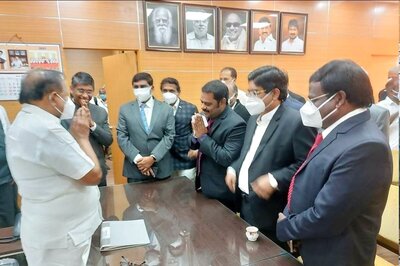
views
Kolkata: Shompen, believed to be one of the last surviving stone-age tribes living inside the dense forests of Great Nicobar, didn’t emerge from the wilderness to exercise their franchise in the Lok Sabha polls at Andaman and Nicobar's Campbell Bay on Thursday.
Polling Andaman and Nicobar, which only has one Lok Sabha seat, ended in the first phase on Thursday.
In the 2014 general elections, for the first time in the islands' history, only two (a 75-year-old male and 32-year-old female) out of its 107 voters came forward to vote.
This time, however, hopes ran high as nearly 35 Shompens, bearing voter ID cards, attended multiple voter information workshops at Laxminagar in Campbell Bay . Despite this none of the Shompens turned up to vote.
Great Nicobar in Nicobar district is nearly 560 km from Port Blair and can be accessed by either a ship or a helicopter. The local administration had made a special booth for the tribal members hoping that more Shompens will come forward to participate in the polls, as compared to the 2014 Lok Sabha elections.
There were two polling stations for the Shompens, including one at Shompen Hut and another at Lawful Bay near Great Nicobar Biosphere Reserve. They belong to the Mongoloid race and are peace-loving and shy in nature. The female members of the community don't tend to come out of the jungle. The tribe mainly survives on wild boar, tortoise meat, honey, fish and Pandanus (fibrous edible fruit).
As per information from the tribal welfare department, the Shompens consider the Moon as their supreme goddess and after the death of a member, their body is buried far from the tribals' place of residence. Their language is said to be similar to coastal Nicobarese.
Speaking to News18, Assistant Commissioner, Campbell Bay, Prem Singh Meena, said, “We have designed the polling booth for Shompen in a manner which is similar to their huts. This was done to bring the primitive aboriginal tribes close to the booths. But no one came forward to cast their votes. The area here is surrounded by deep forest and no one is allowed to enter their (Shompen) zone except for a few selected government officials and a communicator.”
When asked about how the authorities managed to communicate with the tribe regarding their voting rights, Meena said, “We have a Nicobari youth who knows the Shompen language who is helping us.”
Onge and Great Andamanese tribes have been exercising their voting rights for the last few years now. This time 51 Onges, comprising 24 males and 27 females, caste their votes at Dugong Creek and 26 Great Andamanese Tribes, comprising 14 makes and 12 females, voted at Strait Island.


















Comments
0 comment